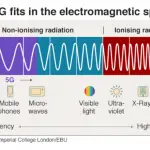Last Updated on 12 months by Francis
EMF, or electromagnetic fields, are invisible areas of energy that surround electronic devices such as cell phones and Wi-Fi routers. As we are all exposed to EMF on a daily basis, concerns have been raised about the possible effects on our health, especially on the brain. In this article, we will explore what EMF does to the brain and the potential risks associated with prolonged exposure.
Contents
Understanding EMF
Electromagnetic fields (EMF) are all around us. They are produced by electronic devices, power lines, and even the sun. EMF is a form of radiation that can be harmful to our health. The level of harm depends on the strength and duration of exposure.
Types of EMF
There are two types of EMF: ionizing and non-ionizing. Ionizing EMF, like X-rays and gamma rays, have enough energy to remove electrons from atoms and molecules, causing damage to cells and DNA. Non-ionizing EMF, on the other hand, does not have enough energy to cause this type of damage, but it can still affect our bodies in other ways.
Sources of EMF
EMF sources are everywhere, and it is impossible to avoid them completely. Common sources of EMF include:
- Cell phones and other wireless devices
- Wi-Fi routers
- Smart meters
- Power lines
- Electrical appliances
- Radio and television broadcasts
The Effect of EMF on the Brain
EMF can affect the brain in several ways. Studies have shown that exposure to EMF can cause changes in brain function and even damage to brain cells.
Neurological Effects
Studies have linked exposure to EMF to several neurological effects, including:
- Headaches
- Dizziness
- Fatigue
- Sleep disturbances
- Memory loss
Brain Tumors
There is some evidence to suggest that long-term exposure to EMF may increase the risk of brain tumors. However, more research is needed to determine the extent of this risk.
Blood-Brain Barrier
The blood-brain barrier is a protective layer that prevents harmful substances from entering the brain. Studies have shown that exposure to EMF can weaken this barrier, allowing toxins and other harmful substances to enter the brain.
Minimizing EMF Exposure
Although it is impossible to avoid EMF completely, there are several steps you can take to minimize your exposure:
Use Wired Devices
Whenever possible, use wired devices instead of wireless ones. This includes using a wired internet connection instead of Wi-Fi and using a wired phone instead of a cell phone.
Keep Devices Away from Your Body
When using wireless devices, keep them away from your body. This includes not carrying your cell phone in your pocket and not sleeping with your phone near your head.
Limit Exposure Time
Limit the amount of time you spend using wireless devices. This includes taking breaks from your phone and computer throughout the day.
Use EMF Protection Devices
There are several devices on the market that claim to protect against EMF. These include EMF-blocking phone cases, radiation shields for laptops, and EMF protection jewelry.
FAQs – What Does EMF Do to Your Brain?
What is EMF and how does it affect the brain?
EMF stands for electromagnetic fields. They are a form of radiation generated by electronic devices and power lines. Research has shown that EMF can penetrate tissues, including the human brain. The effect of exposure to EMF on the brain is a topic of ongoing research, but some studies have suggested that it may lead to changes in brain activity, such as an increase in neurotransmitter activity, and alterations in the way that the brain processes information.
Can EMF cause brain cancer?
There is no conclusive evidence that EMF exposure increases the risk of brain cancer. However, some studies have suggested a possible link between long-term exposure to EMF and an increased risk of brain cancer. It is important to note that many factors contribute to the development of cancer, and more research is needed to determine the extent to which EMF exposure plays a role.
Can EMF exposure cause headaches?
Some people may experience headaches after exposure to electromagnetic fields, though not everyone is affected. Research into the link between EMF and headache is not yet conclusive, but it is thought that exposure to EMF may affect the way that the brain processes sensory information, leading to headaches in some people.
How can I reduce my exposure to EMF?
There are a number of things you can do to reduce your exposure to electromagnetic fields. Limiting the use of electronic devices, keeping them at a distance from the body, and using speakerphone or text messaging instead of holding the phone to the ear can all help reduce exposure. A well-placed EMF shield can also minimize exposure to radiation. Additionally, it is important to ensure that your home and workplace are not located near sources of high electromagnetic fields, such as power lines or cell towers.
Is EMF harmful to children’s developing brains?
Some studies have suggested that exposure to EMF may have a more significant impact on the developing brains of children than on those of adults. It is important to exercise caution when it comes to children’s exposure to electromagnetic fields, and to limit their exposure as much as possible. Parents should be mindful of the amount of time their children spend using electronic devices and should encourage them to take breaks from screen time.







